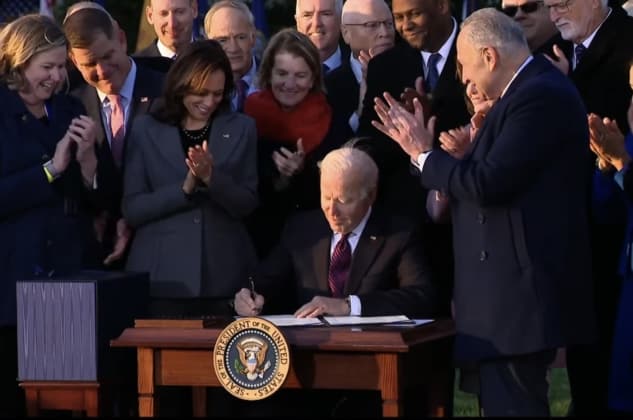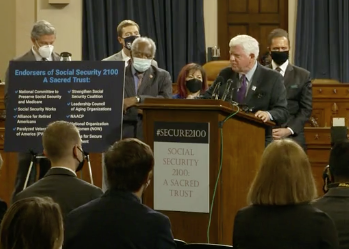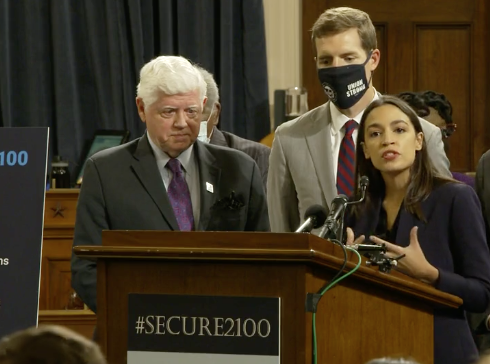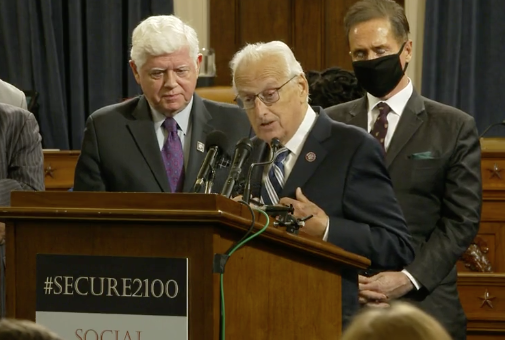House Passage of Build Back Better is Something For Seniors To Be Thankful For

The House of Representatives passed President Biden’s landmark Build Back Better plan this morning — a victory achieved by Democrats to benefit American seniors. The House-enacted legislation represents the biggest expansion of the social safety net for older Americans and their families in five decades. It expands Medicare benefits, lowers prescription drug prices, and adds billions of new dollars for seniors to receive care in their homes and communities — improvements supported by majorities of Americans across party lines.
At a press conference shortly after the vote to pass the Build Back Better plan, House Speaker Nancy Pelosi characterized the bill as “historic” and “transformative.” Seniors’ advocates heartily agree. The National Committee to Preserve Social Security and Medicare lauded the House majority:
“During a season focused on gratitude, American seniors should be thankful to House Democrats for passing President Biden’s Build Back Better plan. Not a single Republican voted for this landmark legislation to lift-up American seniors and families. It is now up to Senate Democrats to get this done.” – Max Richtman, President and CEO, National Committee to Preserve Social Security and Medicare
Here are some of the major benefits in the bill for American seniors:
*Expansion of Medicare coverage to include basic hearing care.
*$150 billion in new funding for Home and Community-based Services (HCBS)
*Medicare drug price negotiation for a select group of medications
*Caps on drug prices linked to inflation
Though seniors’ advocates did not get everything that they wanted in the final House bill, these expansions are historic — and reflect long-held policy goals. Build Back Better is the first comprehensive federal legislation to address soaring prescription drug prices, and the first expansion of Medicare since the Part D prescription drug benefit was enacted in 2003. Notably, that law prohibited Medicare from negotiating with Big Pharma, allowing the industry to engage in price-gouging that has grown increasingly worse with every passing year. The Build Back Better plan finally begins to correct that ill-advised provision, among other measures to tame drug prices.
During months of sometimes contentious maneuverings, compromises were made to accommodate the objection of Democratic moderates in the House and Senate. Seniors’ allies (including the National Committee) pushed to add dental, vision and hearing coverage to Medicare. But in the end, only hearing coverage survived. Advocates had hoped that Medicare would be empowered to negotiate many more medications that seniors depend on, but the list was scaled back to ten drugs (escalating to 20 later), thanks largely to an expensive and relentless lobbying and advertising campaign by Big Pharma. The new funding for HBCS care was cut by more than 60%. These compromises reflect the political realities of passing bold, new legislation within a “big tent” party spanning a range of views — in a closely divided Congress. Nevertheless, Seniors’ advocates will continue to press for all the improvements that older Americans need until those goals are realized.
Meanwhile, the Build Back Better Act moves to the Senate, where it still must clear procedural hurtles (to pass via the budget reconciliation process) and overcome any lingering objections from Democratic moderates, most prominently, Senators Joe Manchin (D-AZ) and Kyrsten Sinema (D-AZ). Moderate Democrats (including Senator Manchin) had demanded an assessment from the Congressional Budget Office (CBO) on the bill’s costs and savings, which was delivered this week. Among other things, the CBO projected that the House’s Build Back Better legislation would produce $296 billion in net savings on prescription drug costs. Policy analysts say those extra funds potentially could be used to further enhance benefits for seniors in the Senate version of the bill, though there are no guarantees that will happen.
Majority Leader Chuck Schumer (D-NY) wants the Senate to vote on the Build Back Better bill as soon as possible, preferably before Christmas. But the Senate has other priorities, too — including raising the debt limit and passing a continuing resolution to keep the government funded. “Whether they can also pass Build Back Better before the end of the year, we just don’t know,” says one Capitol Hill policy analyst.
Whether the Senate enacts the bill before the holidays or early in 2022, the National Committee has a clear message for Democrats. “They must unite around this historic legislation,” says President and CEO Max Richtman. “Seniors and their families are counting on them.”
Biden Signs Bipartisan Infrastructure Plan; Seniors Will Benefit



President Biden signed into law today a bipartisan bill unleashing more than one trillion dollars to rebuild America’s crumbling infrastructure. While not specifically targeted to seniors, the infrastructure plan will help older Americans both directly and indirectly. The plan provides funding for improved public transportation, housing, and high-speed internet access – all of which seniors depend on. When these infrastructure items improve, so does seniors’ quality of life.
The infrastructure plan will also boost Social Security, says Max Richtman, President and CEO of the National Committee to Preserve Social Security and Medicare:
“The bipartisan infrastructure plan that President Biden just signed into law will do more than build roads, bridges, and broadband. It also will give a big boost to Americans’ retirement security. That’s because the new, higher-paying jobs the infrastructure plan will create means more money flowing into Social Security through increased payroll contributions. This new revenue can help extend the solvency of the Social Security trust fund, currently projected to become depleted in 2034.” – Max Richtman, NCPSSM President & CEO, 11/15/21
Just as importantly, the Biden plan will increase the potential for bigger Social Security benefits for workers who get new and better-paying jobs. Higher pay and longer work histories add up to larger Social Security checks. That’s welcome news at a time when more and more seniors rely on Social Security for all or most of their income.
Higher benefits ultimately help everyone – not just beneficiaries – because of Social Security’s stimulus effect on the overall economy.
“Social Security’s positive economic impact shouldn’t be ignored. American families spend more than $1 trillion in Social Security benefits nationwide each year, providing more than $1.6 trillion in economic stimulus to the national economy every year.” – BoostSocialSecurityNow.org
In fact, the National Committee offers a state-by-state breakdown of Social Security’s economic stimulus effect at socialsecurityspotlight.org.
Unlike the Build Back Better plan, a sweeping social safety net bill which will more directly benefit seniors, some Republicans did join Democrats in voting for the President’s infrastructure legislation. And while the Build Back Better plan will only succeed on a party-line vote in the absence of Republican support, the National Committee commends a rare moment of bipartisanship on behalf of rebuilding the country’s infrastructure.
“We applaud the Republicans and Democrats in Congress who joined together to pass this historic legislation — and President Biden for putting it forward. This is exactly what a government that works for the people – both the young and the old – is supposed to do.” – Max Richtman
Democrats’ New Prescription Drug Plan More than a ‘Glass Half Full’



For American seniors, the Democrats’ new agreement on prescription drug pricing reform is definitely more than a glass half full. It is not everything that advocates had hoped for, but it is a historic step toward taming soaring drug prices that force too many seniors to forgo vital medications. Party leaders announced an agreement on Thursday night as part of ongoing efforts to pass President Biden’s Build Back Better plan.
“Fixing prescription drug pricing has consistently been a top issue for Americans year-after-year, including the vast majority of both Democrats and Republican (voters) who want to see a change because they simply cannot afford their medications,” Senate Majority Leader Chuck Schumer, 11/2/21
The agreement would for the first time allow Medicare to negotiate the price of some drugs with Big Pharma. It would also cap seniors’ out-of-pocket drug costs at $2,000 per year. (The current cap is $6,500 annually.) Drug-makers also would be required to pay rebates for any price hikes exceeding the rate of inflation.
“While not nearly as expansive as we had originally proposed, I’m hopeful the agreement’s new inflation rebate and out-of-pocket cap for seniors will work in tandem with Medicare’s negotiation authority to meaningfully lower prescription drug costs for Americans.” – Frank Pallone, Chairman, House Energy & Commerce Committee, 11/2/21
The agreement represents at least a partial victory over Big Pharma, a lobbying behemoth which has pressured many lawmakers to oppose robust drug pricing reform – not to mention the industry’s barrage of misleading television ads to try to convince the public that reform is bad for consumers. Typically, drug-makers have labeled the Democrats latest plan “disastrous.” In truth, it will only be disastrous for Big Pharma if it insists on squeezing maximal profits through prescription price gouging.
Democrats are confident about the plan’s passage now that holdout Senator Kyrsten Sinema (D-AZ) has agreed to it. Her spokesperson says that “the Senator welcomes a new agreement on a historic, transformative Medicare drug negotiation plan that will reduce out-of-pocket costs for seniors.”
Moderate Democrats who blanched at a more comprehensive Medicare negotiation plan also signed onto the new agreement. They include Rep. Scott Peters (D-OH), Kurt Schrader (D-OR), Stephanie Murphy (D-FL), and Kathleen Rice (D-NY).
The National Committee and other seniors’ advocacy groups have long fought for meaningful prescription drug pricing reform. NCPSSM enthusiastically supported H.R. 3, the Elijah Cummings Lower Drug Costs Now Act, which was introduced during the 116th Congress. Advocates’ hopes burned high when Democrats won the White House and took control of the Senate in 2020, seeing it as the best opportunity in more than a generation to lower drug prices. But opposition from moderates in the House and Senate forced party leaders to scale back their plans for comprehensive reform.



Holdout Senator Kyrsten Sinema (D-AZ) has signed onto the party’s latest drug pricing reform plan
Yesterday’s announcement breathed new life into the party’s efforts to lower drug prices.
“It isn’t all we hoped it would be, but at least it opens the door for Medicare drug negotiation,” says Dan Adcock, the National Committee’s director of government relations and policy. “And the out-of-pocket cost cap for seniors is very significant, especially when you consider that one million Medicare beneficiaries, many of whom live on fixed incomes, are currently paying $3,200 or more a year for prescription drugs.”
Adcock expects the new drug reform plan to pass both Houses of Congress, now that moderates who opposed it are on board. “Politics is the art of the possible,” he says, “And this is what appears to be possible for now.”
Rep. Larson Introduces Social Security 2100: A Sacred Trust bill



Rep. John Larson (D-CT) introduced landmark legislation today to expand and strengthen Social Security, with leading members of the seniors’ advocacy community present – including NCPSSM president and CEO Max Richtman. In introducing his Social Security 2100: A Sacred Trust bill, Rep. Larson said that benefits must be boosted and Social Security financially fortified:
“Every day, hard-working Americans contribute to this great program that has never missed a payment and stands as a hallmark to what good governance is about. This bill is what the American people need and richly deserve. Now is the time for us to act.” – Rep. John Larson, 10/26/21
Congressman Larson unveiled the bill in the committee room of the House Ways and Means Social Security subcommittee, which he chairs. Speakers at the event noted that it is the same room where Social Security and Medicare legislation was hammered out in the 1930’s and 1960’s. Rep. Larson pointed out that Social Security benefits have not been enhanced during the past fifty years, and that many seniors are teetering on the edge of poverty — unable to make ends meet under the current benefit structure.
The bill has nearly 200 cosponsors and the enthusiastic backing of the advocacy community. The National Committee to Preserve Social Security and Medicare has championed the program’s expansion for many years, working closely with Rep. Larson’s office.
“To those who claim that no one in Washington has the courage to address Social Security’s challenges, or that the only solution is to cut benefits for future generations, Congressman Larson’s bill is a stunning refutation. For years, seniors and their advocates have demanded these improvements. Rep. Larson has admirably led the charge on Capitol Hill, and with this bill, he has delivered.” – Max Richtman, NCPSSM president and CEO, 10/26/21
Larson’s fellow subcommittee members and other cosponsors of the bill praised the new bill – and Rep. Larson’s leadership on this issue:
“Social Security is one of our nation’s greatest success stories. It stands as a monument to decency and dignity, and is the birthright of every American worker. We have a sacred responsibility to assure its preservation. No one knows that better than John Larson.” – Rep. Bill Pascrell (D-NJ), 10/26/21
The Sacred Trust legislation would boost benefits for everyone on Social Security and provide extra increases to vulnerable groups, such as widows, widowers, and low-wage workers. Rep. Lynda Sanchez, a cosponsor of the bill, said these increases will benefit communities of color, whose lifetime earnings are lower and who typically depend on Social Security for all or most of their income. This bill, she said, “would reach down into these communities and help them live out their older years in dignity.”



Rep. Alexandria Ocasio-Cortez said, “Social Security helped my family through” when her father died of cancer. Rep. Conor Lamb (center) emphasized the program’s importance to veterans.
Rep. Conor Lamb (D-PA) spoke of Social Security’s importance to disabled veterans, while Rep. Alexandria Ocasio Cortez (D-NY) reminded Millennials that they, too, benefit from the social insurance that the program provides all adults and children in the event of a loss of a spouse or family breadwinner – or when a worker becomes disabled.
“When I was a kid, my dad passed away of cancer. My mother was a domestic worker. Social Security checks helped my family through. To have that social safety net isn’t just good for us individually; it helps us feel like we are part of a society that respects our elders and values our vulnerable.” – Rep. Alexandria Ocasio-Cortez (D-NY), 10/26/21
The Sacred Trust bill contains several provisions that seniors and their advocates have sought for years, including:
- An across-the-board benefit boost for all beneficiaries
- Adoption of a fairer, more accurate COLA formula (CPI-E)
- Improving benefits for long-serving, low-wage workers;
- Repealing the Windfall Elimination Provision (WEP) and Government Pension Offset (GPO) that penalize many public servants;
- Providing caregiver credits for time taken out of the workforce to care for children and other dependents.
“Women especially will benefit from this legislation. Women often leave the workforce to take care of loved ones, which lowers their lifetime earnings on which Social Security benefits are based. Under this bill, there will be a credit for those who take time off of work, which will enhance their retirement benefits.” – Rep. Jan Schakowsky, (D-IL), 10/26/21
To pay for these improvements and forestall a projected shortfall in the Social Security trust fund in 2034, the Sacred Trust Act adjusts the wage cap so that earnings above $400,000 are subject to Social Security payroll taxes. This is a long-overdue correction for rising income inequality, where the percentage of wages subject to Social Security payroll taxes has shrunk over the past four decades. It also aligns with President Biden’s pledge not to raise taxes on anyone earning under $400,000 per year.



“Social Security stands as a monument to decency and dignity,” said Rep. Bill Pascrell.
Rep. Larson said that he plans to hold hearings on the Sacred Trust legislation in November, followed by a markup and floor vote in the House. The bill would need at least ten Republican votes to pass the Senate (an outcome that is far from guaranteed) and move to the President’s desk for signature. “No one understands better than President Biden that Social Security is a sacred trust between the people and their government,” said Larson.
A Higher Minimum Wage Would Boost Women in Retirement



The national debate over raising the minimum wage may not seem to have much to do with retirement security. But it truly does, especially for women —– and women of color, in particular. As the Baltimore Sun reported this week, “Female workers make up a large share of low-wage workers, so they stand to benefit from the proposed federal increase as well as from planned phased-in increases in (the states).” The National Committee advocates for a $15 minimum/hour minimum wage, not only because we want workers to earn a living wage, but because it improves women’s retirement security.
We asked NCPSSM senior policy analyst Maria Freese, an expert in women’s retirement issues, why a higher minimum wage is so crucial for women in the long run. For more information, visit www.eleanorshope.org.
How does the minimum wage affect women’s retirement security?
A: The primary reason is that you more you make, the more you’re likely to save for retirement. If you’re a minimum wage worker and the minimum wage goes up — and you have more money in your pocket — you’ll have more money left over to save for retirement. Women’s retirement savings rates historically have lagged behind men’s.
Why does the minimum wage affect women more than men?
A: Because women tend to be in jobs that pay minimum wage, especially women of color. Typical ‘job tracks’ tend to steer women toward lower-paying service and retail positions. There are many reasons for this, including discrimination and a lack of encouragement and training for some women to seek more professional-level work that pays more.
Does the minimum wage affect retirement security in other ways?
A: Yes. It helps hourly wage-earners who have retirement plans at work (such as 401Ks), which are based on a percentage of wages. If your wages go up, your dollar amount contribution to the 401K goes up automatically. You don’t even have to make a change in your 401K plan for that to happen.
How does the minimum wage affect Social Security benefits?
A: Social Security benefits are based on lifetime earnings. If the minimum wage goes up, then many hourly workers earning the minimum wage will receive higher Social Security benefits when they retire.
How would a rise in the minimum wage benefit non-minimum wage earners?
A: There is a linkage between the wages of hourly workers at any given employer and what the employer pays salaried workers. Generally, the higher the wages at the bottom of the ladder, the better the pay at higher levels. It’s a ‘rising tide lifts all boats’ situation. So even if you don’t earn the minimum wage, your pay may go up if the minimum wage increases.
Many in the business community have claimed that raising the minimum wage to $15/hour would kill jobs and drive people out of business. What is your response to that?
A: It’s a myth. Not true. Real-world experience does not bear that out. Look at Washington state, for example. The state raised the minimum wage to nearly $15 an hour, and we have not seen an outflow of businesses or precipitous falloff in jobs (unrelated to the pandemic) compared with other states. In fact, from all indications, the business climate in Washington state (with its higher minimum wage) is very good.
Has there been any progress in Congress on raising the federal minimum wage from the current $7.50/hour?
A: Not much, unfortunately. A $15 federal minimum wage was part of President Biden’s original Build Back Better agenda, but the Senate parliamentarian ruled that the minimum wage couldn’t be raised through the budget reconciliation process — the vehicle that Democrats are using to enact other parts of the President’s agenda on a simple, party-line vote. It appears that enough Republicans would have to vote for a higher minimum wage in order for the measure to pass the Senate. There is more than one bill to do so in Congress, but don’t expect them to go too far until the makeup of the Senate changes. In the meantime, we’ll keep fighting for it.
Visit www.eleanorshope.org for more information!
House Passage of Build Back Better is Something For Seniors To Be Thankful For



The House of Representatives passed President Biden’s landmark Build Back Better plan this morning — a victory achieved by Democrats to benefit American seniors. The House-enacted legislation represents the biggest expansion of the social safety net for older Americans and their families in five decades. It expands Medicare benefits, lowers prescription drug prices, and adds billions of new dollars for seniors to receive care in their homes and communities — improvements supported by majorities of Americans across party lines.
At a press conference shortly after the vote to pass the Build Back Better plan, House Speaker Nancy Pelosi characterized the bill as “historic” and “transformative.” Seniors’ advocates heartily agree. The National Committee to Preserve Social Security and Medicare lauded the House majority:
“During a season focused on gratitude, American seniors should be thankful to House Democrats for passing President Biden’s Build Back Better plan. Not a single Republican voted for this landmark legislation to lift-up American seniors and families. It is now up to Senate Democrats to get this done.” – Max Richtman, President and CEO, National Committee to Preserve Social Security and Medicare
Here are some of the major benefits in the bill for American seniors:
*Expansion of Medicare coverage to include basic hearing care.
*$150 billion in new funding for Home and Community-based Services (HCBS)
*Medicare drug price negotiation for a select group of medications
*Caps on drug prices linked to inflation
Though seniors’ advocates did not get everything that they wanted in the final House bill, these expansions are historic — and reflect long-held policy goals. Build Back Better is the first comprehensive federal legislation to address soaring prescription drug prices, and the first expansion of Medicare since the Part D prescription drug benefit was enacted in 2003. Notably, that law prohibited Medicare from negotiating with Big Pharma, allowing the industry to engage in price-gouging that has grown increasingly worse with every passing year. The Build Back Better plan finally begins to correct that ill-advised provision, among other measures to tame drug prices.
During months of sometimes contentious maneuverings, compromises were made to accommodate the objection of Democratic moderates in the House and Senate. Seniors’ allies (including the National Committee) pushed to add dental, vision and hearing coverage to Medicare. But in the end, only hearing coverage survived. Advocates had hoped that Medicare would be empowered to negotiate many more medications that seniors depend on, but the list was scaled back to ten drugs (escalating to 20 later), thanks largely to an expensive and relentless lobbying and advertising campaign by Big Pharma. The new funding for HBCS care was cut by more than 60%. These compromises reflect the political realities of passing bold, new legislation within a “big tent” party spanning a range of views — in a closely divided Congress. Nevertheless, Seniors’ advocates will continue to press for all the improvements that older Americans need until those goals are realized.
Meanwhile, the Build Back Better Act moves to the Senate, where it still must clear procedural hurtles (to pass via the budget reconciliation process) and overcome any lingering objections from Democratic moderates, most prominently, Senators Joe Manchin (D-AZ) and Kyrsten Sinema (D-AZ). Moderate Democrats (including Senator Manchin) had demanded an assessment from the Congressional Budget Office (CBO) on the bill’s costs and savings, which was delivered this week. Among other things, the CBO projected that the House’s Build Back Better legislation would produce $296 billion in net savings on prescription drug costs. Policy analysts say those extra funds potentially could be used to further enhance benefits for seniors in the Senate version of the bill, though there are no guarantees that will happen.
Majority Leader Chuck Schumer (D-NY) wants the Senate to vote on the Build Back Better bill as soon as possible, preferably before Christmas. But the Senate has other priorities, too — including raising the debt limit and passing a continuing resolution to keep the government funded. “Whether they can also pass Build Back Better before the end of the year, we just don’t know,” says one Capitol Hill policy analyst.
Whether the Senate enacts the bill before the holidays or early in 2022, the National Committee has a clear message for Democrats. “They must unite around this historic legislation,” says President and CEO Max Richtman. “Seniors and their families are counting on them.”
Biden Signs Bipartisan Infrastructure Plan; Seniors Will Benefit



President Biden signed into law today a bipartisan bill unleashing more than one trillion dollars to rebuild America’s crumbling infrastructure. While not specifically targeted to seniors, the infrastructure plan will help older Americans both directly and indirectly. The plan provides funding for improved public transportation, housing, and high-speed internet access – all of which seniors depend on. When these infrastructure items improve, so does seniors’ quality of life.
The infrastructure plan will also boost Social Security, says Max Richtman, President and CEO of the National Committee to Preserve Social Security and Medicare:
“The bipartisan infrastructure plan that President Biden just signed into law will do more than build roads, bridges, and broadband. It also will give a big boost to Americans’ retirement security. That’s because the new, higher-paying jobs the infrastructure plan will create means more money flowing into Social Security through increased payroll contributions. This new revenue can help extend the solvency of the Social Security trust fund, currently projected to become depleted in 2034.” – Max Richtman, NCPSSM President & CEO, 11/15/21
Just as importantly, the Biden plan will increase the potential for bigger Social Security benefits for workers who get new and better-paying jobs. Higher pay and longer work histories add up to larger Social Security checks. That’s welcome news at a time when more and more seniors rely on Social Security for all or most of their income.
Higher benefits ultimately help everyone – not just beneficiaries – because of Social Security’s stimulus effect on the overall economy.
“Social Security’s positive economic impact shouldn’t be ignored. American families spend more than $1 trillion in Social Security benefits nationwide each year, providing more than $1.6 trillion in economic stimulus to the national economy every year.” – BoostSocialSecurityNow.org
In fact, the National Committee offers a state-by-state breakdown of Social Security’s economic stimulus effect at socialsecurityspotlight.org.
Unlike the Build Back Better plan, a sweeping social safety net bill which will more directly benefit seniors, some Republicans did join Democrats in voting for the President’s infrastructure legislation. And while the Build Back Better plan will only succeed on a party-line vote in the absence of Republican support, the National Committee commends a rare moment of bipartisanship on behalf of rebuilding the country’s infrastructure.
“We applaud the Republicans and Democrats in Congress who joined together to pass this historic legislation — and President Biden for putting it forward. This is exactly what a government that works for the people – both the young and the old – is supposed to do.” – Max Richtman
Democrats’ New Prescription Drug Plan More than a ‘Glass Half Full’



For American seniors, the Democrats’ new agreement on prescription drug pricing reform is definitely more than a glass half full. It is not everything that advocates had hoped for, but it is a historic step toward taming soaring drug prices that force too many seniors to forgo vital medications. Party leaders announced an agreement on Thursday night as part of ongoing efforts to pass President Biden’s Build Back Better plan.
“Fixing prescription drug pricing has consistently been a top issue for Americans year-after-year, including the vast majority of both Democrats and Republican (voters) who want to see a change because they simply cannot afford their medications,” Senate Majority Leader Chuck Schumer, 11/2/21
The agreement would for the first time allow Medicare to negotiate the price of some drugs with Big Pharma. It would also cap seniors’ out-of-pocket drug costs at $2,000 per year. (The current cap is $6,500 annually.) Drug-makers also would be required to pay rebates for any price hikes exceeding the rate of inflation.
“While not nearly as expansive as we had originally proposed, I’m hopeful the agreement’s new inflation rebate and out-of-pocket cap for seniors will work in tandem with Medicare’s negotiation authority to meaningfully lower prescription drug costs for Americans.” – Frank Pallone, Chairman, House Energy & Commerce Committee, 11/2/21
The agreement represents at least a partial victory over Big Pharma, a lobbying behemoth which has pressured many lawmakers to oppose robust drug pricing reform – not to mention the industry’s barrage of misleading television ads to try to convince the public that reform is bad for consumers. Typically, drug-makers have labeled the Democrats latest plan “disastrous.” In truth, it will only be disastrous for Big Pharma if it insists on squeezing maximal profits through prescription price gouging.
Democrats are confident about the plan’s passage now that holdout Senator Kyrsten Sinema (D-AZ) has agreed to it. Her spokesperson says that “the Senator welcomes a new agreement on a historic, transformative Medicare drug negotiation plan that will reduce out-of-pocket costs for seniors.”
Moderate Democrats who blanched at a more comprehensive Medicare negotiation plan also signed onto the new agreement. They include Rep. Scott Peters (D-OH), Kurt Schrader (D-OR), Stephanie Murphy (D-FL), and Kathleen Rice (D-NY).
The National Committee and other seniors’ advocacy groups have long fought for meaningful prescription drug pricing reform. NCPSSM enthusiastically supported H.R. 3, the Elijah Cummings Lower Drug Costs Now Act, which was introduced during the 116th Congress. Advocates’ hopes burned high when Democrats won the White House and took control of the Senate in 2020, seeing it as the best opportunity in more than a generation to lower drug prices. But opposition from moderates in the House and Senate forced party leaders to scale back their plans for comprehensive reform.



Holdout Senator Kyrsten Sinema (D-AZ) has signed onto the party’s latest drug pricing reform plan
Yesterday’s announcement breathed new life into the party’s efforts to lower drug prices.
“It isn’t all we hoped it would be, but at least it opens the door for Medicare drug negotiation,” says Dan Adcock, the National Committee’s director of government relations and policy. “And the out-of-pocket cost cap for seniors is very significant, especially when you consider that one million Medicare beneficiaries, many of whom live on fixed incomes, are currently paying $3,200 or more a year for prescription drugs.”
Adcock expects the new drug reform plan to pass both Houses of Congress, now that moderates who opposed it are on board. “Politics is the art of the possible,” he says, “And this is what appears to be possible for now.”
Rep. Larson Introduces Social Security 2100: A Sacred Trust bill



Rep. John Larson (D-CT) introduced landmark legislation today to expand and strengthen Social Security, with leading members of the seniors’ advocacy community present – including NCPSSM president and CEO Max Richtman. In introducing his Social Security 2100: A Sacred Trust bill, Rep. Larson said that benefits must be boosted and Social Security financially fortified:
“Every day, hard-working Americans contribute to this great program that has never missed a payment and stands as a hallmark to what good governance is about. This bill is what the American people need and richly deserve. Now is the time for us to act.” – Rep. John Larson, 10/26/21
Congressman Larson unveiled the bill in the committee room of the House Ways and Means Social Security subcommittee, which he chairs. Speakers at the event noted that it is the same room where Social Security and Medicare legislation was hammered out in the 1930’s and 1960’s. Rep. Larson pointed out that Social Security benefits have not been enhanced during the past fifty years, and that many seniors are teetering on the edge of poverty — unable to make ends meet under the current benefit structure.
The bill has nearly 200 cosponsors and the enthusiastic backing of the advocacy community. The National Committee to Preserve Social Security and Medicare has championed the program’s expansion for many years, working closely with Rep. Larson’s office.
“To those who claim that no one in Washington has the courage to address Social Security’s challenges, or that the only solution is to cut benefits for future generations, Congressman Larson’s bill is a stunning refutation. For years, seniors and their advocates have demanded these improvements. Rep. Larson has admirably led the charge on Capitol Hill, and with this bill, he has delivered.” – Max Richtman, NCPSSM president and CEO, 10/26/21
Larson’s fellow subcommittee members and other cosponsors of the bill praised the new bill – and Rep. Larson’s leadership on this issue:
“Social Security is one of our nation’s greatest success stories. It stands as a monument to decency and dignity, and is the birthright of every American worker. We have a sacred responsibility to assure its preservation. No one knows that better than John Larson.” – Rep. Bill Pascrell (D-NJ), 10/26/21
The Sacred Trust legislation would boost benefits for everyone on Social Security and provide extra increases to vulnerable groups, such as widows, widowers, and low-wage workers. Rep. Lynda Sanchez, a cosponsor of the bill, said these increases will benefit communities of color, whose lifetime earnings are lower and who typically depend on Social Security for all or most of their income. This bill, she said, “would reach down into these communities and help them live out their older years in dignity.”



Rep. Alexandria Ocasio-Cortez said, “Social Security helped my family through” when her father died of cancer. Rep. Conor Lamb (center) emphasized the program’s importance to veterans.
Rep. Conor Lamb (D-PA) spoke of Social Security’s importance to disabled veterans, while Rep. Alexandria Ocasio Cortez (D-NY) reminded Millennials that they, too, benefit from the social insurance that the program provides all adults and children in the event of a loss of a spouse or family breadwinner – or when a worker becomes disabled.
“When I was a kid, my dad passed away of cancer. My mother was a domestic worker. Social Security checks helped my family through. To have that social safety net isn’t just good for us individually; it helps us feel like we are part of a society that respects our elders and values our vulnerable.” – Rep. Alexandria Ocasio-Cortez (D-NY), 10/26/21
The Sacred Trust bill contains several provisions that seniors and their advocates have sought for years, including:
- An across-the-board benefit boost for all beneficiaries
- Adoption of a fairer, more accurate COLA formula (CPI-E)
- Improving benefits for long-serving, low-wage workers;
- Repealing the Windfall Elimination Provision (WEP) and Government Pension Offset (GPO) that penalize many public servants;
- Providing caregiver credits for time taken out of the workforce to care for children and other dependents.
“Women especially will benefit from this legislation. Women often leave the workforce to take care of loved ones, which lowers their lifetime earnings on which Social Security benefits are based. Under this bill, there will be a credit for those who take time off of work, which will enhance their retirement benefits.” – Rep. Jan Schakowsky, (D-IL), 10/26/21
To pay for these improvements and forestall a projected shortfall in the Social Security trust fund in 2034, the Sacred Trust Act adjusts the wage cap so that earnings above $400,000 are subject to Social Security payroll taxes. This is a long-overdue correction for rising income inequality, where the percentage of wages subject to Social Security payroll taxes has shrunk over the past four decades. It also aligns with President Biden’s pledge not to raise taxes on anyone earning under $400,000 per year.



“Social Security stands as a monument to decency and dignity,” said Rep. Bill Pascrell.
Rep. Larson said that he plans to hold hearings on the Sacred Trust legislation in November, followed by a markup and floor vote in the House. The bill would need at least ten Republican votes to pass the Senate (an outcome that is far from guaranteed) and move to the President’s desk for signature. “No one understands better than President Biden that Social Security is a sacred trust between the people and their government,” said Larson.
A Higher Minimum Wage Would Boost Women in Retirement



The national debate over raising the minimum wage may not seem to have much to do with retirement security. But it truly does, especially for women —– and women of color, in particular. As the Baltimore Sun reported this week, “Female workers make up a large share of low-wage workers, so they stand to benefit from the proposed federal increase as well as from planned phased-in increases in (the states).” The National Committee advocates for a $15 minimum/hour minimum wage, not only because we want workers to earn a living wage, but because it improves women’s retirement security.
We asked NCPSSM senior policy analyst Maria Freese, an expert in women’s retirement issues, why a higher minimum wage is so crucial for women in the long run. For more information, visit www.eleanorshope.org.
How does the minimum wage affect women’s retirement security?
A: The primary reason is that you more you make, the more you’re likely to save for retirement. If you’re a minimum wage worker and the minimum wage goes up — and you have more money in your pocket — you’ll have more money left over to save for retirement. Women’s retirement savings rates historically have lagged behind men’s.
Why does the minimum wage affect women more than men?
A: Because women tend to be in jobs that pay minimum wage, especially women of color. Typical ‘job tracks’ tend to steer women toward lower-paying service and retail positions. There are many reasons for this, including discrimination and a lack of encouragement and training for some women to seek more professional-level work that pays more.
Does the minimum wage affect retirement security in other ways?
A: Yes. It helps hourly wage-earners who have retirement plans at work (such as 401Ks), which are based on a percentage of wages. If your wages go up, your dollar amount contribution to the 401K goes up automatically. You don’t even have to make a change in your 401K plan for that to happen.
How does the minimum wage affect Social Security benefits?
A: Social Security benefits are based on lifetime earnings. If the minimum wage goes up, then many hourly workers earning the minimum wage will receive higher Social Security benefits when they retire.
How would a rise in the minimum wage benefit non-minimum wage earners?
A: There is a linkage between the wages of hourly workers at any given employer and what the employer pays salaried workers. Generally, the higher the wages at the bottom of the ladder, the better the pay at higher levels. It’s a ‘rising tide lifts all boats’ situation. So even if you don’t earn the minimum wage, your pay may go up if the minimum wage increases.
Many in the business community have claimed that raising the minimum wage to $15/hour would kill jobs and drive people out of business. What is your response to that?
A: It’s a myth. Not true. Real-world experience does not bear that out. Look at Washington state, for example. The state raised the minimum wage to nearly $15 an hour, and we have not seen an outflow of businesses or precipitous falloff in jobs (unrelated to the pandemic) compared with other states. In fact, from all indications, the business climate in Washington state (with its higher minimum wage) is very good.
Has there been any progress in Congress on raising the federal minimum wage from the current $7.50/hour?
A: Not much, unfortunately. A $15 federal minimum wage was part of President Biden’s original Build Back Better agenda, but the Senate parliamentarian ruled that the minimum wage couldn’t be raised through the budget reconciliation process — the vehicle that Democrats are using to enact other parts of the President’s agenda on a simple, party-line vote. It appears that enough Republicans would have to vote for a higher minimum wage in order for the measure to pass the Senate. There is more than one bill to do so in Congress, but don’t expect them to go too far until the makeup of the Senate changes. In the meantime, we’ll keep fighting for it.
Visit www.eleanorshope.org for more information!


